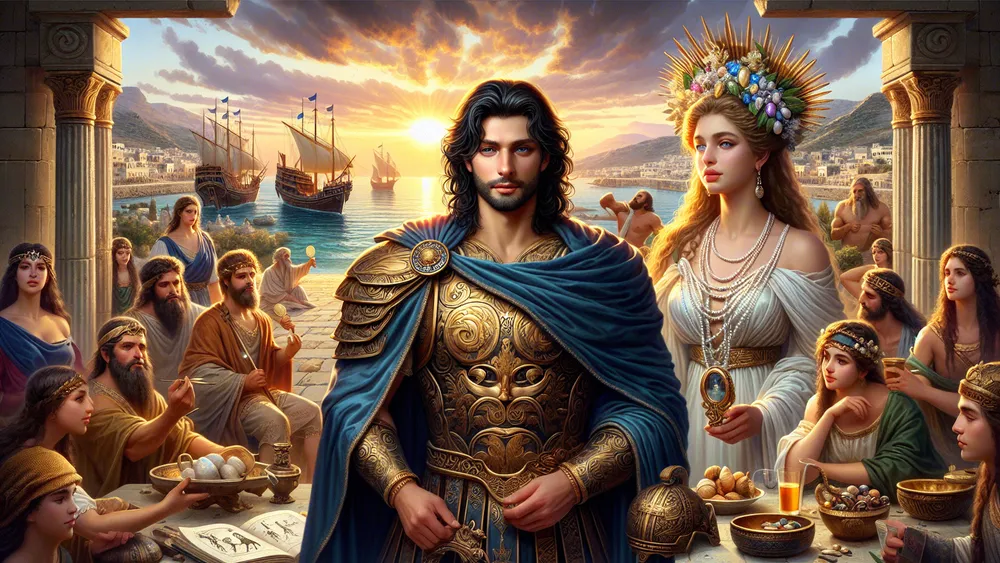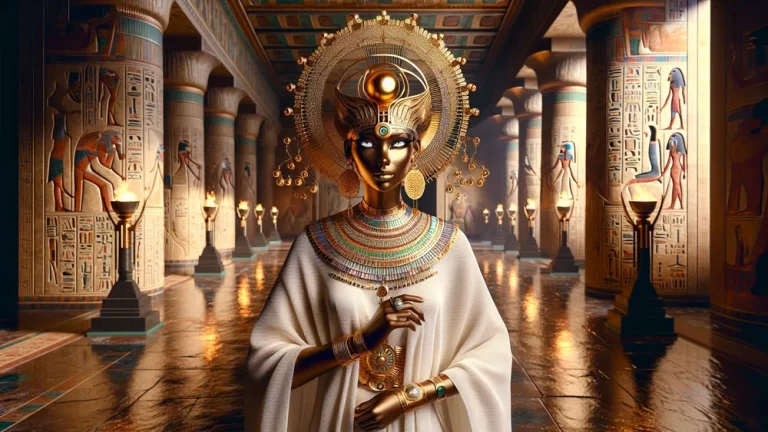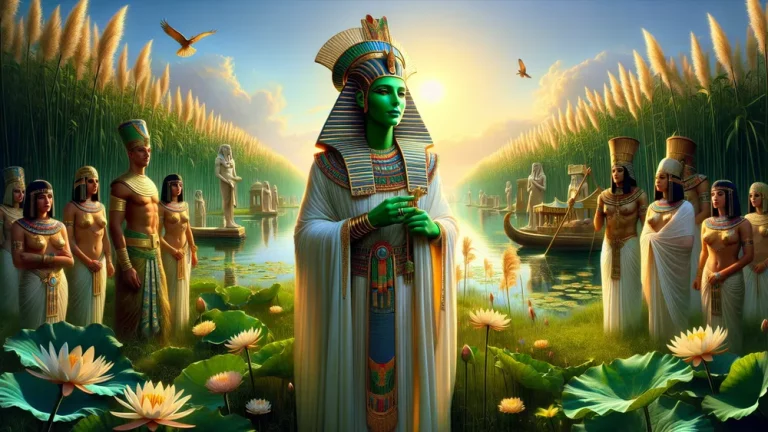The History And Mythology Of Cyprus (Akte) In Ancient Times
In ancient times, people gave Cyprus the name Akte, and it stands out as a place where myths and geography meet in a critical way. Sitting in the Eastern Mediterranean, it was both a key stop for sailors from old civilizations and a place where gods were believed to be born and honored.
Key Points:
- Cyprus was known as Akte in ancient times, meaning coast or headland, showing its historical sea-link importance.
- Aphrodite, the goddess of love, was said to be born here, making it central to her myths and worship.
- The island connected cultures like the Greeks, Egyptians, and Phoenicians, blending their myths and practices.
- Cyprus’s trade in copper during the Bronze Age built its wealth and linked myths to its resources.
- Local myths mention nymphs and spirits tied to Cyprus’s natural features like springs and forests.
- Apollo was said to establish sanctuaries here, linking Cyprus to his prophetic and cultural roles.
- Cyprus influenced myths by blending Egyptian goddess Hathor’s traits with Aphrodite’s image.
For example, Greek mythology celebrates Cyprus as the home of Aphrodite, the goddess of love and beauty, which writers like Hesiod made sure would never be forgotten. And this is not the only reason Cyprus matters – its position linked it with many cultures, like the Egyptians and Phoenicians, and helped build common myths everyone shared.
Experts in myths point out that the term “Akte” basically means “coast” or “headland,” which matches its role as a stronghold by the sea. This idea inspired ancient travelers and continues to interest people who still tell these stories. Cyprus’s location joined physical trade routes with imaginary adventures, such as those of heroes like Odysseus. Not every tale about the island is the same, though.
Stories differ depending on where they come from, which creates a rich mix of ideas. In this post, you will go deeper into these myths, understand their meaning in culture, and learn how Cyprus turned into an essential part of the ancient world’s mythology.
Cyprus (Akte): Overview and Key Facts
| Category | Details |
|---|---|
| Name in Ancient Times | In history, people called the island Akte in Greek. This word means “coast” or “headland.” Its location by the sea made it a critical place. |
| Geographic Location | An island sitting in the Eastern Mediterranean, south of Turkey, west of Syria and Lebanon, and southeast of Greece. It was a key meeting place for trade. |
| Cultural Importance | A center where Greek, Egyptian, and Phoenician civilizations blended. They shared ideas, languages, stories, and religious practices across the region. |
| Mythological Significance | According to myth, Aphrodite – the goddess of love – was born there. The city of Paphos became a major place for her worship. |
| Historical Background | Signs show people lived on this island as far back as the Neolithic period (around 9000 BCE). Later, it became a center for copper trade during the Bronze Age. |
| Etymology of Name | The name “Cyprus” today comes from the Greek word kypros, which refers to copper, one of the island’s key resources. |
| Religious Practices | Temples were built for gods such as Aphrodite and Apollo. Festivals and rituals on the island mixed local ideas with those from other cultures. |
| Role in Greek Mythology | The island appears in several myths about Aphrodite. Also, stories about Greek heroes, like those from the Trojan War, discuss Cyprus. |
| Relation to Other Cultures | Cyprus had close ties with Egypt and Phoenicia. Worship practices on the island connect Aphrodite with other goddesses, like Hathor in Egypt. |
| Economic Significance | Copper from Cyprus was used in tools, weapons, and trade. This resource brought wealth and importance to the island. |
| Natural Features and Symbolism | The island’s strong cliffs, clean coastlines, and fertile land were useful but also became parts of myths, like the story of Aphrodite’s birth. |
How Cyprus Got Its Start and Its Legendary Roots
The beginnings of Cyprus involve a close mix of mythology and historical events. Both myths and real-life history connect with each other to create the story of what the island was and why it mattered.
Here, you will see how its early myths shaped its culture, and you will also learn about the traditions that made it important in ancient times. Myths and history were not separate – they combined together to build how the island played a critical role in the world long ago.
Cyprus in Stories from Ancient Greece: The Aktaion Link
In many Greek myths, Cyprus was important both as a real location and as an idea. In the Eastern Mediterranean, it was seen as a place between Europe and the Levant, pointing to its role in trade and exploration by sea. The word Akte means “coast” or “headland.” This shows how the island was tied closely to the sea.
In myths, it became a key place connected to stories of long journeys. Even though Cyprus did not appear in all Greek tales, it was part of a wider group of places thought to matter in navigation and mythology. Homer’s Odyssey, for example, included many references to islands that mattered for travelers, which is why people still connected Cyprus to both real journeys and mythical ones.
Its position made it a central place, both in myths and for real trades.

Many famous myths are tied to Cyprus, helping us better understand its place in ancient storytelling. Among them are:
- The Birth of Aphrodite: According to Hesiod’s Theogony, the goddess Aphrodite came from the sea near Cyprus, after a part of Uranus fell into the waves. This made the island her sacred birthplace.
- Odysseus’s Journeys: While The Odyssey does not mention Cyprus directly, its place in the sea made it a likely stop for travelers, connecting it indirectly to tales like his.
- Temples to Apollo: The god Apollo was said to establish temples and oracles here. These places became centers for worship and important cultural exchanges.
- Heroes and the Trojan War: Heroes like Agamemnon and Menelaus were believed to pass by Cyprus on their way back from Troy, weaving it into the stories of the heroic age’s most famous events.
With myths about Aphrodite, Apollo, and famous Greek heroes, Cyprus became part of both the stories of gods and the sagas of those who lived in the real world centuries ago.
Cyprus played a crucial role in ancient myths and real journeys, being linked to gods like Aphrodite and Apollo, as well as heroes from the Trojan War, while acting as a key point for trade and exploration.
Aphrodite and Her Strong Connection to Cyprus
Aphrodite’s link to Cyprus starts with her well-known birth from sea foam. The story comes from Hesiod’s Theogony, which says that when Kronos cut Uranus with a sickle, Uranus’s genitals fell into the sea. From a mix of blood and sea foam, Aphrodite appeared as a goddess, already fully formed.
She moved smoothly toward the shores of Cyprus, especially near Paphos, which became connected to her story in Greek tradition. This event, described in ancient art, is often said to mean several important things: the foam represents purity, the sea explains her endless beauty, and the cliffs at Paphos become a physical reminder of her birth.
Some myths suggest that she might have arrived at other places, but Cyprus remains the most accepted site for her origins, making this island strongly linked to her story. Many saw Cyprus as special to Aphrodite because of its natural beauty and its importance to ancient people.
The peaceful shores and fertile land of the island, tied to growth and love, made it feel fitting for a goddess whose powers included these qualities. Paphos became the center of her myth, not just as her supposed birthplace but also as a place people thought she lived, a place where her power was strongest.
Nearby cliffs and beaches added to her story. The fact that Cyprus also functioned as a meeting place for merchants meant that ideas about Aphrodite could spread to other areas like Greece and Phoenicia. Over time, Cyprus became the main center for worshiping Aphrodite. Large temples were built for her, and complex rituals and ceremonies were held to honor her.
At Paphos, people built famous sanctuaries with altars where they made offerings and prayed. Archaeologists have found proof of religious ceremonies here that involved a mix of Greek, Cypriot, and Phoenician ideas. Another important site for her followers was Amathus, a city that also became connected to her worship. Festivals such as the Aphrodisia, where people came to honor her, brought participants from many places around the Mediterranean.
These events and spaces helped Aphrodite’s myth grow further, making Cyprus the place most connected to her story and spreading worship of the goddess well beyond the island’s shores.

Cyprus and Egypt: Where Their Myths Meet
In ancient times, Cyprus and Egypt had a strong connection through busy sea routes that allowed them to trade goods, share ideas, and influence each other’s beliefs. They developed ties by trading Cypriot copper and Egyptian luxury goods like gold and papyrus. But it wasn’t only about trading objects. These exchanges also led to a mixing of cultural ideas and myths.
Ports like Kition and Paphos were places where Egyptians brought their goods and beliefs, which made a lasting impact on Cypriot culture. This sharing of ideas is clearly seen in how Cypriot gods began to take on the qualities of Egyptian deities.
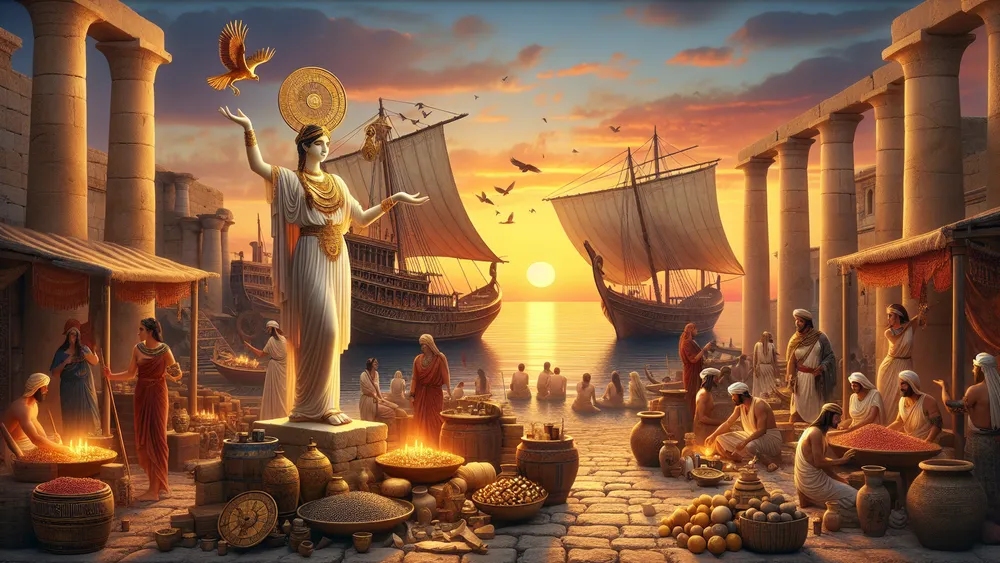
A significant example of this is the similarities between female goddesses, such as Aphrodite in Cyprus and Hathor in Egypt, which connected the religions of both regions. The similarities between Hathor and Aphrodite are one of the most interesting results of this blending. Hathor was a vital Egyptian goddess connected to beauty, music, motherhood, and fertility. These are traits also linked to Aphrodite.
Hathor was shown as a cow or a woman with cow horns surrounding a solar disk, symbols that represented life and femininity in Egypt. In Cyprus, Aphrodite’s image – like her association with love and beauty – can be understood in a similar way. Some artistic depictions of Aphrodite from Cyprus even seem to copy ideas from Hathor’s sacred cow imagery.
Researchers believe that Egyptian beliefs influenced how Cypriots thought of Aphrodite, especially when their trade relationship was at its height. This ability of myths to change and adapt over time explains how human connections shaped the cultures of both civilizations.
Apollo’s Visits and What They Meant for Cyprus
Apollo’s role in Cyprus is part of myths about how he brought order, knowledge, and guidance to the world. People in ancient Greek traditions believed he created important places on the island.
Stories say that these included sacred temples and, in some accounts, even towns such as Tamassos. Though the details of these myths differ, Apollo being linked to specific locations in Cyprus means the island was seen as part of his influence outside mainland Greece. As a god tied to prophecy, Apollo was thought to be a way for humans to reach the gods.
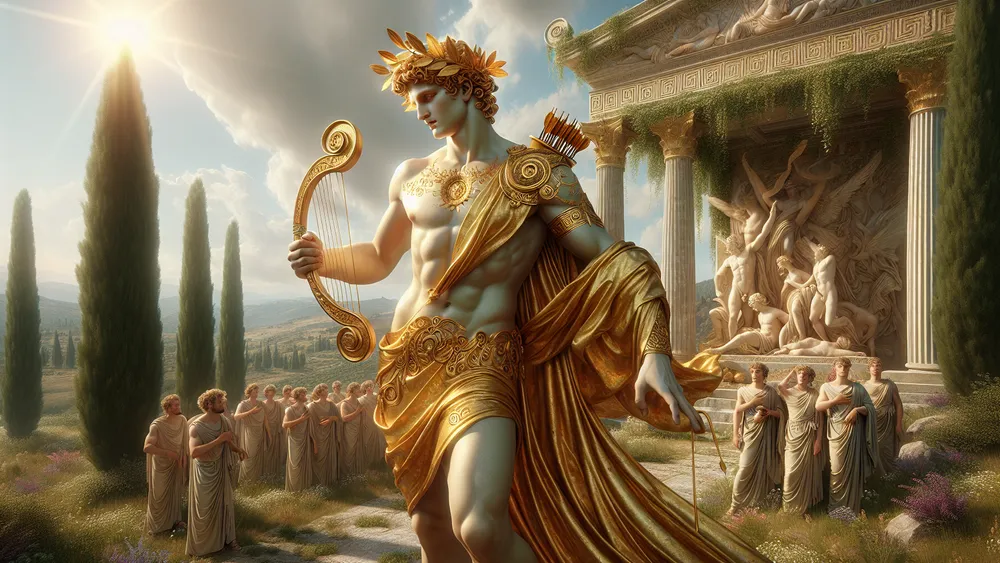
In Cyprus, it is likely that local traditions had practices similar to his famous oracles at Delphi. At these oracles, priests would speak for Apollo and give advice about the future. In these ways, Apollo became more than just a god people prayed to in Cyprus. He also influenced how life on the island was shaped, including both its religion and culture.
Myths about him left a mark that lasted on the island’s traditions, just as they did in other places where he was worshiped.
Enchanting Stories Linked to Cyprus
For centuries, Cyprus has been a place where myths about gods, heroes, and people happened. These tales, which include stories of beauty, affection, and exciting events, bring together many aspects of its history. Starting with the arrival of gods and continuing with reminders of heroic deeds, each story shows how deeply Cyprus was connected to both humans and divine figures from ancient times.
Aphrodite’s Sacred Gardens and Their Legends
The love story between Aphrodite and Adonis is one of the most well-known myths connected to the sacred gardens of Paphos. According to the story, Adonis, who was a mortal man with unusual good looks, won the love of Aphrodite, the goddess herself. Their love took place in beautiful gardens that were filled with flowers and represented Aphrodite’s power over love, fertility, and passion.
These gardens, which people thought of as perfect and full of life, were where their happiness began. But it was also where tragedy struck. Adonis was killed early in life, gored by a wild boar that some say was sent as punishment from the gods, perhaps out of jealousy. Some versions of the story say that roses grew where Aphrodite cried over Adonis, and from the blood he left behind.
These flowers became symbols of both their love and the sadness of losing it. Because of this, these gardens became sacred and mythologically important. They stood for both how short life can be and how nature keeps renewing itself. In Paphos, where people worshipped Aphrodite, there were places like temples that connected her myths to that region.

An important site here is the sanctuary of Aphrodite at Kouklia, where people prayed to her and left offerings so they could celebrate her powers over life and love. Ancient records say that events like the Adonia Festival may have included acting out Aphrodite’s grief for Adonis, mixing her myths with ideas about life and death tied to farming seasons.
The gardens, rather than being only part of the stories, were also treated as sacred spaces by people who lived there. Through these places and ceremonies, the city of Paphos made sure that Aphrodite and Adonis were remembered, linking their myth to the ways people lived and worshipped in ancient times.
The myth of Aphrodite and Adonis ties the sacred gardens of Paphos to love, loss, and renewal, symbolized by nature and rituals that honored Aphrodite’s connection to life and passion.
The Trojan War, Heroes, and Cyprus’ Famous Copper
Cyprus was so famous for its copper that people even linked the name of the island to the metal itself. Back in the Bronze Age, huge amounts of copper were taken from Cyprus and sent to many places across the Mediterranean. Its many mines gave the island a natural resource that helped older civilizations grow and expand.
The Greeks believed that copper came from the gods, often mentioning Hephaestus, god of fire, who worked in his forge to create tools and weapons. Because Cyprus had both copper and a location near important trade routes, it became known as a place for both trade and myths about gods.
Copper was especially important when it came to war, as people needed it to make weapons and tools. This meant that Cyprus played a big role during such times, including the Trojan War, because its resources and location were very useful. Some well-known heroes from the Trojan War are also connected to Cyprus. On his way back to Greece, Menelaus is said to have stopped in Cyprus.
While there, he built altars to Athena and Apollo, showing the island’s link to gods and their worship. In some stories, Agamemnon may also have visited Cyprus, perhaps to gather supplies such as copper for his ships. In these tales, Cyprus is seen as both a resting place and a practical stop during the heroes’ long journeys.
Even though details of these visits vary between ancient stories, they suggest that Cyprus was both a cultural meeting point and an economic resource for people, gods, and myths across the region.
The connection between Cyprus and ancient legends was not just about its heroes, but also about its natural resources. Some examples include:
- The belief that Cyprus’s copper mines were tied to blessings from Hephaestus, the god of metalwork.
- Tales of weapons said to be made in Cyprus, which helped win battles and were linked to divine approval.
- The idea that Aphrodite herself gave Cyprus its minerals as signs of prosperity and fertility.
These stories helped people see Cyprus as important both for its resources and its place in myths, showing how much its natural gifts mattered in the ancient world.
The Nymphs and Spirits of Cyprus: Local Myths
For many ages, Cyprus has been linked to nymphs and spirits, who were said to live near its springs, green forests, and rocky shores. These beings were thought to protect the natural beauty of the island. In ancient Greece, myths often connected nymphs to specific places. Cyprus was no different.
Local stories spoke of water nymphs who stayed by special springs, which people believed brought fertility to the land. They were also said to find joy in the lands tied to Aphrodite. Forest nymphs, on the other hand, lived in the wooded areas of Cyprus. They watched over the groves that were important to gods or well-known people.
One story tells of the Aktaion spirits, which may have been connected to the legendary hunter Aktaion, who was changed into a stag by Artemis. People believed that these spirits lived in the wild and remote areas of Cyprus. Some described them as unusual beings tied to the untamed places on the island. They were seen as both kind and difficult. If treated with respect, they cared for people.
If the land was harmed, they punished those responsible. In this way, the spirits reminded people of nature’s importance and the need to protect it. These myths about nymphs and spirits reflected how Cyprus’s natural beauty was a key part of its identity. People saw them as more than just stories. They were lessons about respecting the land, similar to how caretakers care for nature in different cultures today.

Greek Gods and Their Reflections in Cyprus
In ancient times, Cyprus was closely tied to the worship of Greek gods. It became a specific place where their stories and roles changed to fit the island’s culture and geography.
One of the most important gods for Cyprus was Aphrodite. People said she was born from the sea near Paphos. Temples, which were large buildings, were built to honor her, and rituals were organized to celebrate her role as the goddess of love and beauty. Another well-known god, Apollo, was also praised in Cyprus.
He had special sanctuaries on the island that linked him to music, telling the future, and healing. These traditions connected Cyprus’s worship to practices in Mediterranean regions. The gods’ influence in Cyprus went beyond individual deities. It also included ideas about forces in nature, such as the sea, fertility, and the soil itself. These natural and cultural forces were honored throughout the island.
For further details about divine forces and their meaning, you can visit this list of all the Greek Abstract and Natural Forces. Because of these shared beliefs, Cyprus became a small version of Greek mythology, where both local landmarks and long-standing traditions helped honor the gods in unique ways.
FAQs
1. Why was Cyprus called Akte?
Cyprus was called “Akte” because its coastal prominence, as a significant maritime hub, resonated with the Greek term for “coast” or “headland.”
2. Which gods were most revered in ancient Cyprus?
The gods most revered in ancient Cyprus included Aphrodite, who was central to the island’s identity and worship, alongside Apollo and other deities associated with fertility and seafaring.
3. What are Aphrodite’s most famous myths tied to Cyprus?
Aphrodite’s most famous myths tied to Cyprus include her mythological birth from the sea foam near Paphos and her sacred connection to the island as the center of her worship in antiquity.
4. How did Cyprus influence Greek and Phoenician myths?
Cyprus influenced Greek and Phoenician myths by serving as a cultural crossroads where the worship of gods like Aphrodite and Astarte intertwined, blending their mythologies and religious practices.

